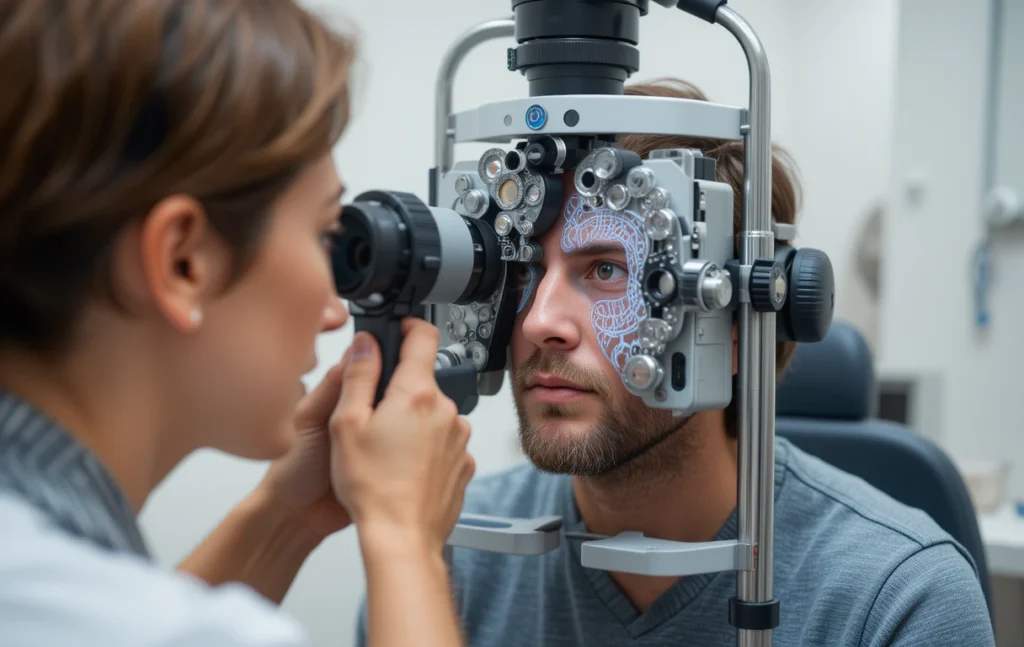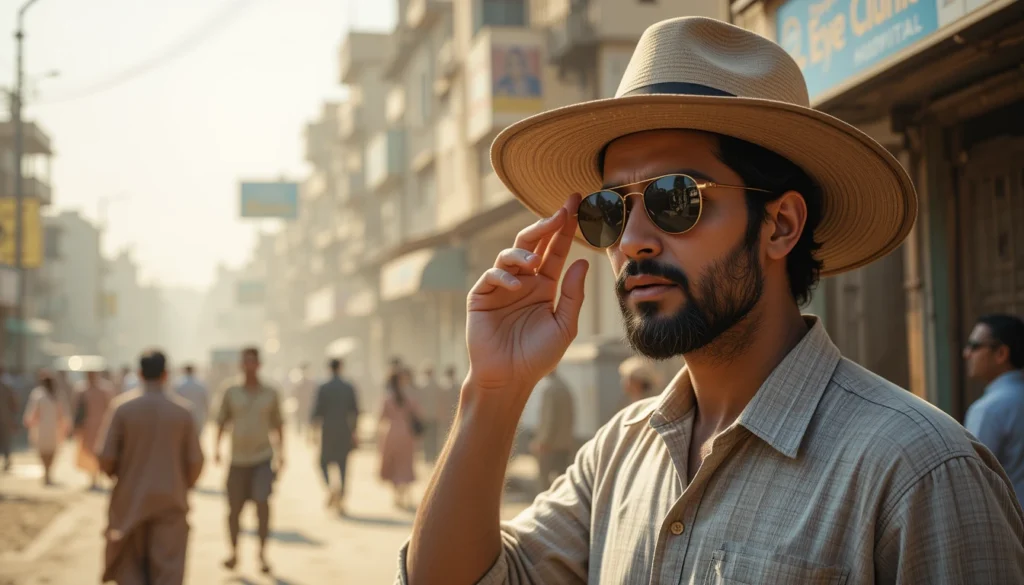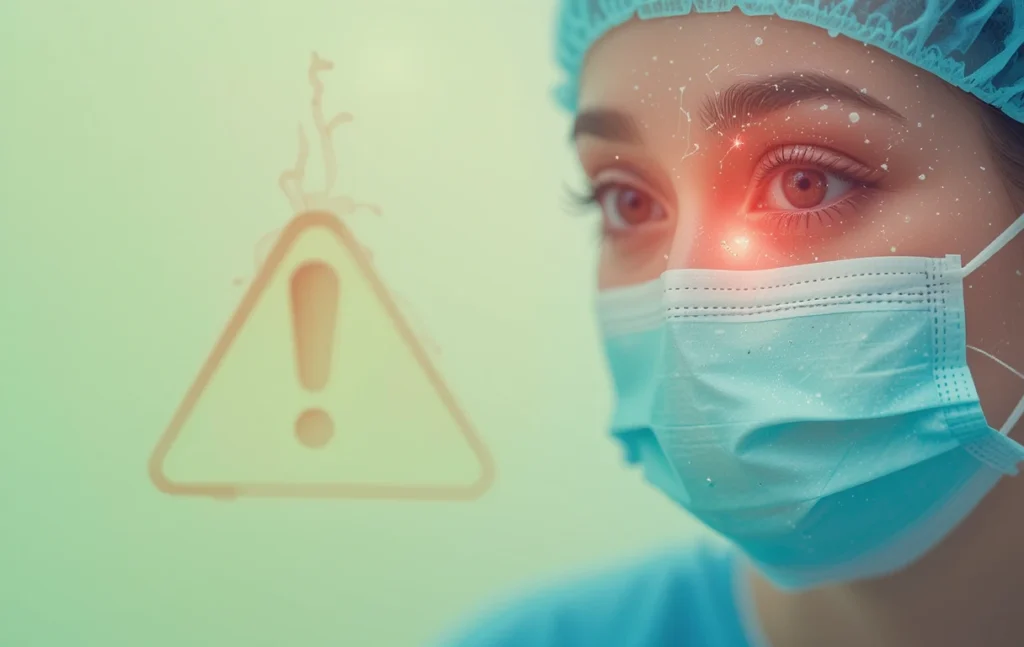
Imagine waking up one day and not seeing your family’s faces clearly. My uncle, who lives in Lahore, loved reading newspapers every morning. One day, he noticed the words on the side of the page were missing, but he thought it was just old age. Months later, he could not see his grandchildren playing right beside him. By the time he visited the eye doctor, it was too late. Glaucoma had stolen most of his vision, and it was never coming back.
This is not just my uncle’s story. It could be yours, your parents’, or your neighbor’s. Glaucoma is called the “silent thief of sight” because it sneaks up without warning and takes away your vision forever.
What Is Glaucoma?
Glaucoma is an eye disease that damages the optic nerve, the part of your eye that sends pictures to your brain. If the optic nerve gets damaged, you start losing your vision. The worst part? Most people feel no pain and see no changes in the early stages.
- Glaucoma often starts by taking away side (peripheral) vision first.
- You may not notice anything until the disease is very advanced.
- Once vision is lost, it cannot come back.
Why Is Glaucoma So Dangerous in Pakistan?
- In Pakistan, there are more than 1.8 million people with glaucoma.
- Almost half of them are already blind because they did not know they had the disease or could not get treatment in time.
- 90% of people in Pakistan have no awareness about glaucoma.
- Many people think vision loss is just part of getting old or due to evil spirits, so they do not see a real eye doctor.
“Glaucoma is the major cause of blindness not only in Pakistan but the whole world.” – Dr. Mirza Shafiq Baig, Dow University of Health Sciences
Who Is at Risk?
Anyone can get glaucoma, but some people have a higher risk:
- People over 40 years old
- People with a family history of glaucoma
- Diabetics
- People with high blood pressure
- Those who are very nearsighted (high myopia)
- People who have had eye injuries
How Does Glaucoma Steal Your Sight?
Glaucoma often happens when the pressure inside your eye (called intraocular pressure) gets too high. This pressure damages the optic nerve slowly over time. But sometimes, even people with normal eye pressure can get glaucoma.
Symptoms of Glaucoma: The Silent Thief
- Most people feel nothing at first.
- No pain, no redness, no blurry vision in the beginning.
- Gradually, you lose your side vision, but your brain fills in the missing parts, so you don’t notice.
- By the time you notice, the disease is usually very advanced and vision loss is permanent.
Glaucoma in Pakistan
| Fact | Number/Percentage |
|---|---|
| People with glaucoma in Pakistan | 1.8 million |
| Glaucoma patients already blind | About 900,000 (50%) |
| People aware of glaucoma symptoms | Only 32.6% |
| People who know glaucoma causes blindness | Only 27.4% |
| People who believe glaucoma is curable | Over 80% (incorrect) |
How Can You Protect Your Eyes?
1. Get Regular Eye Check-ups
- Everyone over 30 should get their eyes checked every 1-2 years, even if they feel fine.
- If you have risk factors, get checked more often.
2. Know the Risk Factors
- If you have diabetes, high blood pressure, or a family history of glaucoma, tell your eye doctor.
3. Don’t Wait for Symptoms
- Glaucoma is called the “silent thief” because it gives no warning.
- Early detection is the only way to save your sight.
4. Trust Qualified Eye Doctors
- Avoid quacks and traditional healers.
- Only a trained eye doctor can check for glaucoma with special tests.
How Is Glaucoma Diagnosed?
Doctors use special tools to check for glaucoma:
- Eye pressure test (tonometry)
- Dilated eye exam to look at the optic nerve
- Visual field test to check side vision
These tests are quick and painless. You can learn more about these tests at the National Eye Institute.
Can Glaucoma Be Treated?
Yes, but only if caught early!
- Eye drops to lower eye pressure
- Laser surgery to help fluid drain from the eye
- Microsurgery to create a new drainage channel
But remember: Any vision lost before treatment cannot be restored.
Real Story: A Mother’s Warning
Mrs. Tahir from Rawalpindi lost vision in one eye because she ignored her doctor’s advice. She thought her blurry vision was just due to old age. Now, she tells everyone in her village to get their eyes checked regularly. She says, “If I had gone to the doctor earlier, maybe I could still see my grandchildren’s faces.”
Why Is Awareness So Low in Pakistan?
- Many people do not know about glaucoma or its dangers.
- Most believe it is curable or not serious.
- People often visit eye doctors only when they have severe problems.
“There is a need for increased public health education to reduce glaucoma blindness in Pakistan.” – PAFMJ Study on Urban Punjab
What Should You Do Next?
- Share this information with your family and friends.
- If you are over 30, book an eye check-up today.
- If you have diabetes, high blood pressure, or a family history of eye problems, see an eye doctor every year.
- Don’t wait for pain or blurry vision-glaucoma is silent!
You can read more about glaucoma at the Aga Khan University Hospital’s page and the National Eye Institute.
Frequently Asked Questions
Q: Can children get glaucoma?
A: Yes, but it is rare. Most cases happen in adults over 40.
Q: Is glaucoma curable?
A: No. Treatment can stop or slow down vision loss, but it cannot bring back lost vision.
Q: Is it expensive to treat glaucoma?
A: Medicines and surgery can be costly, but losing your sight is even more costly. Early detection saves money and vision.
Quick Tips to Save Your Sight
- Get your eyes checked every 1-2 years.
- Tell your doctor if you have a family history of glaucoma.
- Take your eye drops or medicines as prescribed.
- Never ignore changes in your vision.
Don’t Let Glaucoma Steal Your Sight!
If you or someone you love is over 30, has diabetes, high blood pressure, or a family history of blindness, please consult a qualified eye doctor today. Remember, glaucoma is the silent thief of sight. Don’t let it steal your world in silence-act now!
For more information, visit National Eye Institute or Aga Khan University Hospital.
Note: This article is for information only. Always consult a real eye doctor for medical advice.


